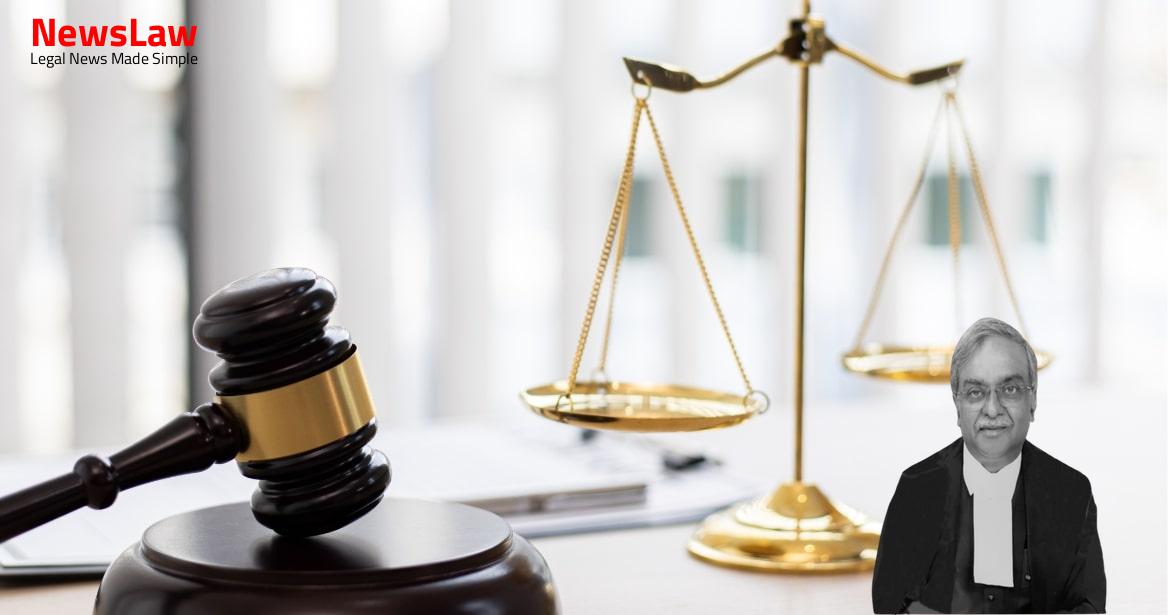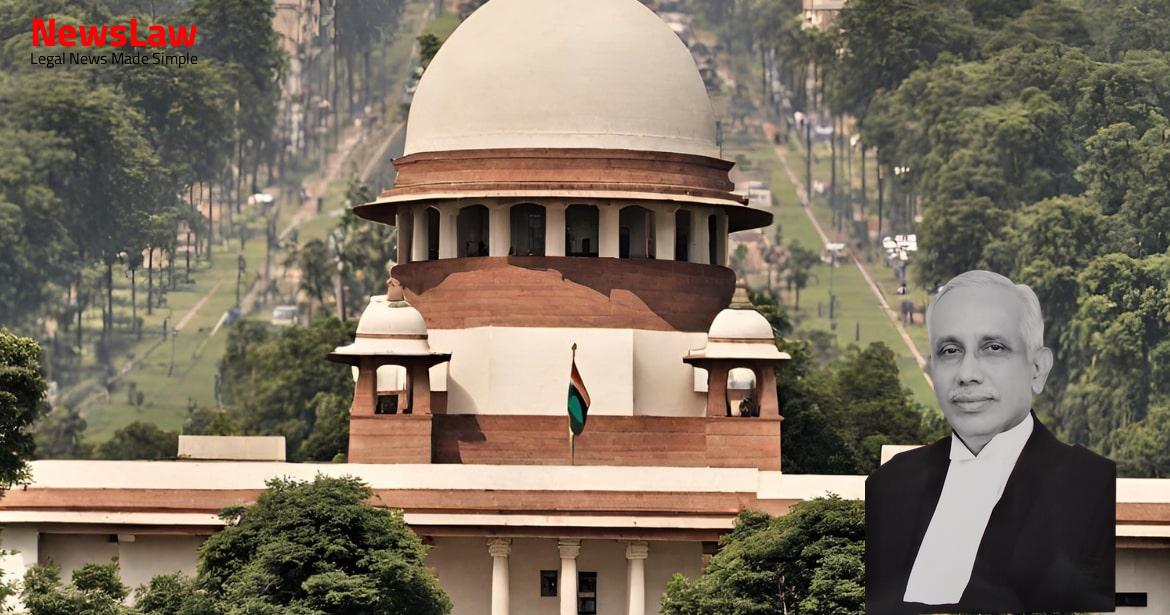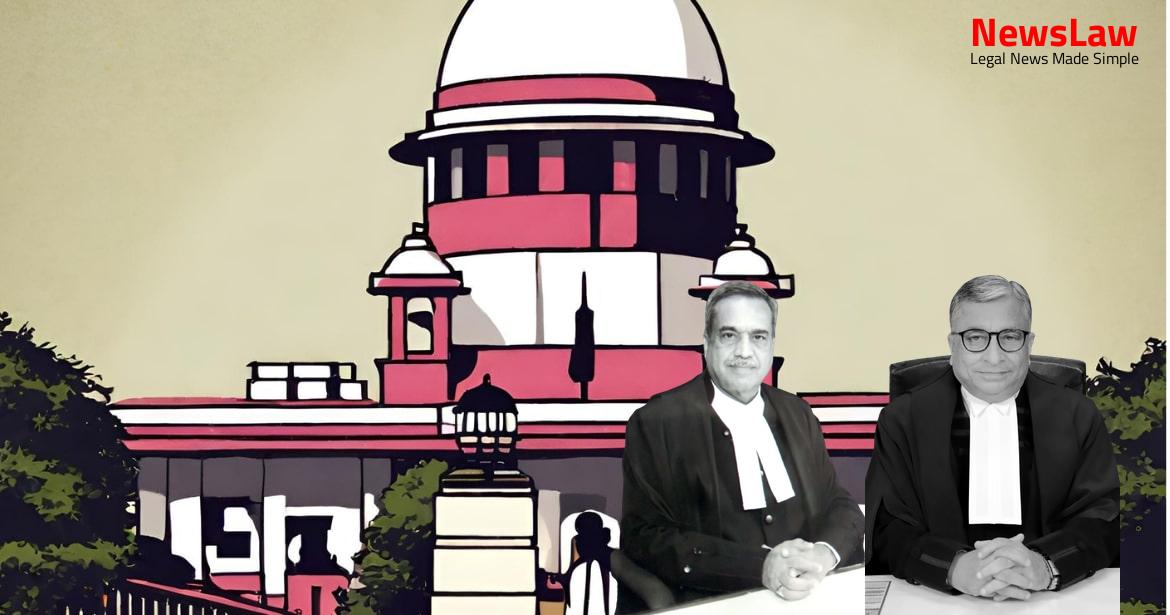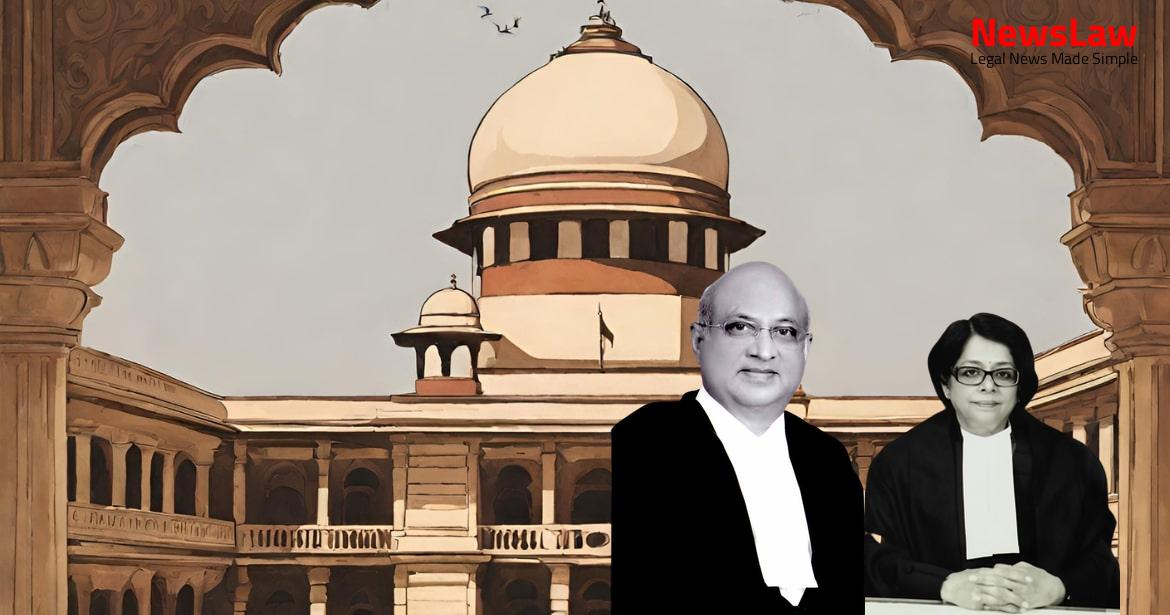In a significant legal battle over land ownership, the Supreme Court of India ruled in favor of Appellant No.1 regarding the validity of the sale deed involving Respondent No.1. The case involved intricate details of the sale transaction and registration process, leading to a prolonged dispute between the parties. After careful consideration of the evidence presented, justice has been served in favor of the appellant in this landmark judgment.
Facts
- Appellant No.1 and his minor brother were granted a Sale Deed on 02.12.1985 for the suit land, but due to deficient stamp duty, the deed remained unregistered.
- An inspection in the Sub-Registrar’s office revealed a Conveyance Deed dated 03.12.2010 in favor of the respondent.
- Appellants filed a suit for cancellation of the 2010 Sale Deed and for perpetual injunction. The suit was dismissed, leading to an appeal.
- Defendant No.2 contested stating deficiencies in the suit, non-joinder of necessary parties, and issues with registration and validity of the Sale Deed.
- High Court judgment challenged citing the sale deed with minors as valid and raising other legal points.
- Fraud was uncovered when the appellants discovered the transfer of the same property to the respondent after it had earlier been transferred to them.
- The appellants’ appeal was registered, and the case proceeded to a Second Appeal.
- Trial Court findings: Issues 1, 2, 4, 5, and 6 decided negatively due to the appellants being minors.
- Issues 7, 8, 9, and 10 decided affirmatively by the Trial Court.
- High Court judgment dated 09.06.2022 allowed the appeal and restored Trial Court’s decision, dismissing the suit.
- District Judge’s judgment dated 7 March 2019 set aside Trial Court’s decision and decreed the suit in favor of the appellants.
- Trial Court initially dismissed the suit on 24.02.2016 after considering evidence from both parties.
Also Read: Interpretation of Drawer Liability: Company vs. Authorized Signatory
Issue
- Plaintiffs sought relief of permanent injunction against the defendants in the suit.
- Trial Court framed issues including proving possession and ownership of the suit land by plaintiffs.
- Defendants tried to take forcible possession of the suit land from plaintiffs, as alleged by the plaintiffs.
- The sale deed dated 02.12.1985 was considered valid as it was signed by the vendor, even though not by the vendees.
- Plaintiffs proved ownership of the suit land by virtue of the registered sale deed dated 02.12.1985.
- The deed of conveyance dated 03.12.2010 registered at serial No. 9176 was found to be void-ab-initio by the plaintiffs.
- The defendants failed to prove that the sale deed dated 02.12.1985 was not enforceable by law.
- First Appellate Court’s findings on possession and occupation of the suit property were in favor of the plaintiffs.
Arguments
- Appellant No.1 claimed ownership based on a sale deed from 1985, which was not validly registered according to the Registration Act.
- The subsequent purchaser, Respondent No.1, argued he was a bona fide purchaser without notice and had acquired valid title.
- Appellant No.1 admitted being a minor at the time of the sale deed, but his mother, the natural guardian, represented his minor brother mentioned in the deed.
- There was emphasis on the lack of proper proof of sale consideration and the incorrect age mentioned in the sale deed.
- Various judgments, including Raghunath vs Kedar Nath and M/s Paul Rubber Industries vs Amit Chand Mitra, were cited to support arguments.
- The collusion between Respondent Nos.1 and 2 was inferred from Respondent No.2’s behavior in court.
- The burden of proof was on the plaintiff, and the onus did not shift to Respondent No.2 due to the lack of evidence presented by Appellant No.1.
- Section 41 of the Transfer of Property Act was referenced in relation to the bona fide purchase for value without notice.
- Section 114 of the Indian Evidence Act regarding presumption of certain facts by the Court was also discussed.
- Ultimately, the validity of the sale deed from 1985 and the subsequent sale to Respondent No.1 were central issues in the case.
- Respondent No.2 did not cross-examine the Appellant No.1, enter the witness box, lead evidence, or file a second appeal against the judgment of the first Appellate Court.
- The sale deed in favor of the Appellant was registered after 26 years due to encroachment on the property.
- The suit filed by the Appellant was deemed not maintainable as it did not seek a declaration of title and only requested the cancellation of the sale deed and a permanent injunction.
- Both parties have the burden to establish their cases once issues are framed; it is incorrect to argue that the burden lies solely on the respondent.
- The registration of the sale deed dated 02.12.1985 was challenged as mandatory legal conditions were not fulfilled.
- Cases were cited to support the argument that a sale contract with a minor as the vendee would be void ab-initio, and that conveyance by way of sale occurs only at the time of registration of a sale deed.
- The suit was further considered not maintainable as no relief for declaration of title was sought.
- Key questions raised include the execution of the sale deed by Respondent No.2, payment of sale consideration, timely presentation for registration, the impact of delayed registration, the effect of non-mutation on rights, the existence of any rights left with Respondent No.2 post the sale deed, the validity of the sale deed due to alleged minor vendees, and the bona fide nature of the subsequent sale deed by the Appellant.
Also Read: Land Dispute Case: Supreme Court Rules on Specific Performance and Compensation
Analysis
- Land ownership is a key arena for powerplay and exploitation in our society.
- The weaker individuals often fall victim to fraud and deceit by those with greater power.
- This imbalance leads to the continued oppression of the marginalized in society.
- Greed and deception are prevalent factors in the perpetuation of this power dynamic.
- The Court analyzed the evidence presented by both parties, both oral and documentary.
- The document of sale was executed on 02.12.1985 and presented for registration on 05.12.1985.
- The delay of 26 years in registration does not benefit the respondents.
- The vendor did not appear in court to support his pleadings or provide evidence.
- The Court emphasized the importance of ensuring justice and preventing unjust enrichment.
- The sale deed in question was registered much before 2001 and was not challenged.
- The appellant stated that he did not remember who presented the document for registration.
- The Court noted various discrepancies in the arguments made by the respondents.
- The Court highlighted the importance of registration and presumption of correctness attached to registered documents.
- The burden of proof regarding execution and payment of consideration was wrongly shifted to the plaintiff.
- The respondents did not challenge the sale deed in favor of collaterals and failed to provide evidence to support their claims.
- Cases relied upon by Respondent No 2 do not extend any benefit in present case
- Judgments cited are distinguishable on facts
- To avoid burden on instant judgment, not dealing with them on individual facts
Decision
- Proof of payment of costs must be filed within ten weeks.
- Liability for costs is to be shared equally by both respondents.
- Exemplary costs of Rs.10,00,000/- to be paid to the appellants within eight weeks.
- Judgment of the High Court is set aside, and the first Appellate Court’s decision in favor of the appellants is restored.
- The appeal is allowed based on the discussions and findings presented.
Case Title: KAUSHIK PREMKUMAR MISHRA Vs. KANJI RAVARIA @ KANJI (2024 INSC 540)
Case Number: C.A. No.-001573-001573 – 2023



